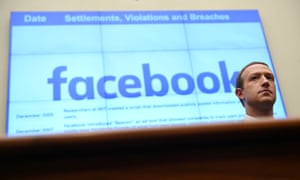The Guardian - Back to home
How key Republicans inside Facebook are shifting its politics to the right
Company has been accused of pro-Republican bias, in both policy and personnel, amid fears it could be broken up if a Democrat wins in 2020
David Smith in Washington
Sun 3 Nov 2019
 David Brock of Media Matters for America: ‘Mark Zuckerberg continues to kowtow to the right and rightwing criticism.’ Photograph: Marcio Jose Sanchez/AP
David Brock of Media Matters for America: ‘Mark Zuckerberg continues to kowtow to the right and rightwing criticism.’ Photograph: Marcio Jose Sanchez/AP
Facebook has been accused of pro-Republican bias, in both policy and personnel, amid fears at the company that it could be broken up if a Democrat wins the White House next year.
Chief executive Mark Zuckerberg faced fierce criticism this week, first for including Breitbart – once described by former chairman Steve Bannon as a “platform for the ‘alt-right’” – in its list of trusted sources for Facebook News, then for refusing to ban or factcheck political advertising.
Zuckerberg is also locked in a high-profile battle with the Massachusetts senator Elizabeth Warren, a leading contender for the Democratic nomination in 2020 who has vowed to regulate big tech companies because they stifle competition and wield too much influence.
Although the social media giants are based in liberal California and often accused of anti-conservative bias, observers note that Facebook has recruited former Republican operatives in senior positions and is bound to put self-interest above anything else.
David Brock, founder and chairman of Media Matters for America, a progressive media watchdog, said: “Mark Zuckerberg continues to kowtow to the right and rightwing criticism.
It began when he met with a bunch of rightwingers in May 2016 and then Facebook changed its algorithm policies and we saw a lot of fake news as a result.
“I think there’s a consistent pattern of Zuckerberg and the Breitbart issue is the most recent one where the right is able to make false claims of conservative bias on Facebook and then he bends over backwards to accommodate that criticism.”
Brock, a former conservative journalist turned Democratic operative, added: “I think there’s also the issue of a cluster of conservative Republican operatives who are running the policy shops at Facebook, which just compounds the problem. That you’ve got the major senior players all coming out of Republican politics is not great for the perception of fairness that Facebook should be trying to project.”
The Republican strain in Facebook was highlighted in a recent edition of the Popular Information newsletter, which stated that the top three leaders in the company’s Washington office are veteran party operatives. “Facebook’s DC office ensures that the company’s content policies meet the approval of Republicans in Congress,” Popular Information said.
Joel Kaplan, vice-president of global public policy at Facebook, manages the company’s relationships with policymakers around the world. A former law clerk to archconservative justice Antonin Scalia on the supreme court, he served as deputy chief of staff for policy under former president George W Bush from 2006 to 2009, joining Facebook two years later.
Warren noted on Twitter this week: “Since he was hired, Facebook spent over $71 million on lobbying—nearly 100 times what it had spent before Kaplan joined.”
She added: “Facebook is now spending millions on lobbying amid antitrust scrutiny—and Kaplan is flexing his DC rolodex to help Mark Zuckerbeg [sic] wage a closed-door charm offensive with Republican lawmakers.”
In one telling incident last year, Kaplan sat behind Brett Kavanaugh, who had been accused of sexual assault, during his bitterly divisive supreme court nomination hearing, prompting an angry backlash from Facebook staff. According to the New York Times, Kaplan wrote to them: “I want to apologize. I recognize this moment is a deeply painful one – internally and externally.”
Yet he still threw a celebratory party for Kavanaugh once he was confirmed.
Kaplan has reportedly advocated for rightwing sites such as Breitbart and the Daily Caller, which earlier this year became a partner in Facebook’s factchecking program. Founded by Fox News’s Tucker Carlson, the Daily Caller is pro-Trump, anti-immigrant and widely criticised for the way it reported on a fake nude photo of the Democratic congresswoman Alexandria Ocasio-Cortez.
Facebook’s Washington headquarters also includes Kevin Martin, vice-president of US public policy and former chairman, under Bush, of the Federal Communications Commission – where a congressional report said his “heavy-handed, opaque and non-collegial management style … created distrust, suspicion and turmoil”. He has forcefully spoken out against proposals to break up Facebook.
Katie Harbath, the company’s public policy director for global elections, led digital strategy for Rudy Giuliani’s 2008 presidential campaign and the Republican National Committee. She has been the principal defender of the company’s decision to allow political adverts, even those including blatantly misleading claims, a move that earned a sharp rebuke from the screenwriter Aaron Sorkin among others and put it at odds with Twitter, which announced this week that it will refuse such ads.
Brock said: “I think Twitter did the right thing here and the only solution, really, is to do what Twitter did, but Facebook is in the opposing camp there.”
Facebook’s failure to filter out far-right hate speech and misinformation is a running controversy. Its decision to include Breitbart in its news tab’s algorithmic selections was widely condemned.
In another report, Popular Information said it uncovered a network of 14 big Facebook pages that, violating the company’s rules, pretend to be independent but exclusively promote content from the conservative site the Daily Wire, which it described as “a cesspool of misogyny, bigotry, and misinformation”.
Several Democrats have raised the prospect of regulating Facebook, with Warren the most outspoken. The senator has said she would nominate regulators to unwind anti-competitive mergers such as its deals for WhatsApp and Instagram. Last month she mocked the Facebook’s failure to factcheck politicians by running ads containing the false claim that Zuckerberg is endorsing Trump’s re-election.
Warren’s ascent in the polls has set off alarm bells at Facebook. In a leaked audio recording last month, Zuckerberg could be heard telling employees: “But look, at the end of the day, if someone’s going to try to threaten something that existential, you go to the mat and you fight.”
Critics suggest that he therefore sees currying favor with Republicans who, for all their suspicion of big tech companies, are generally against regulation, as an act of self-preservation. There are fears that, four years after Trump exploited Facebook to get elected, the platform might again tilt in his favor.
Zuckerberg “has to be worried about what happens to Facebook if there’s a Democratic president”, Brock added. “I don’t think the answer to that is the way he’s behaving because all he’s doing is riling up Democratic opposition to Facebook policies, so I’m not sure what the logic is catering to the conservatives if he’s scared of Democratic regulation.”
But for the Facebook founder, who has reportedly held a series of meetings with Republican politicians and conservative commentators, it might be a case of be careful what you wish for. The president’s eldest son, Donald Trump Jr, wrote an opinion column for the Hill website in September entitled Free speech suppression online builds case to break up Big Tech. Josh Hawley, a Republican senator, is an outspoken critic of Silicon Valley.
Conversely, Facebook is hardly a political monolith. Hundreds of staff signed a letter to Zuckerberg and other leaders denouncing the decision to allow political ads containing falsehoods.
Sheryl Sandberg, the chief operating officer, told Vanity Fair’s New Establishment summit last month: “I imagine I will support a Democratic nominee. I have spoken for many years about my desire for my daughter and yours to see a woman as president.”
Matt Stoller, a fellow at the Open Markets Institute, argued that Zuckerberg and Sandberg are reckless “authoritarians” who helped get Jair Bolsonaro elected in Brazil and will do whatever it takes to preserve their power.
“I don’t see why Facebook book wouldn’t give Trump a massive, unlimited donation to get him re-elected. Who would even be able to find out whether they did that?”
But Stoller, author of Goliath: The Hundred Year War Between Monopoly Power and Democracy, added: “I’m not saying that they are just for Republicans. I think that they are as likely to try to destroy Josh Hawley or to try to promote Kamala Harris or Pete Buttigieg or other candidates they like as they are to help Trump.
“They’re authoritarians. They don’t care particularly about which party is in charge.”
Facebook’s Washington office did not respond to a request for comment.

Geen opmerkingen:
Een reactie posten
Opmerking: Alleen leden van deze blog kunnen een reactie posten.